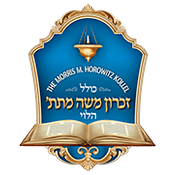
Parshas Matos-Maasei 1
Rashi explains that we learn from this pasuk that Moshe Rabbeinu was חלק כבודלנשיאים by teaching them first, and only afterwards continuing to teach the rest of Bnei Yisroel. Rashi continues to explain that it was in this same order that Moshe gave over all of the commandments to the nation, and the reason…









